This premium content is exclusive to edie Members.
To find out more about edie Membership, please click below.
If you are an existing member, login here
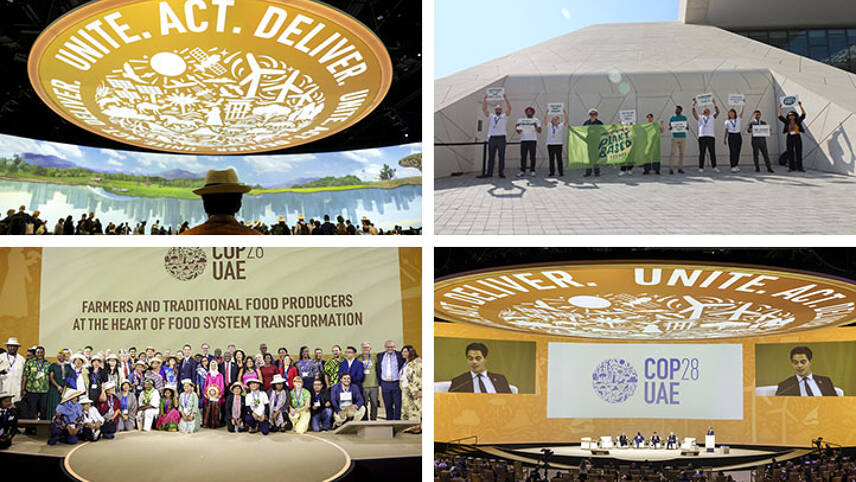
Images (excluding top right) / Christophe Viseux COP28 UNFCCC Flickr
It may be the weekend for edie’s readers in the UK, but at COP28, negotiations and side events will continue through the days (and some of the nights) until Tuesday 12 December, when it is hoped that the final negotiated texts will be agreed upon.
As the sun sets in Dubai, we bring you seven of the biggest stories from COP28 today, including a major new roadmap to eliminate hunger and a flimsy first draft of a global adaptation agenda.
Draft texts of Global Adaptation Plan fail to inspire green groups
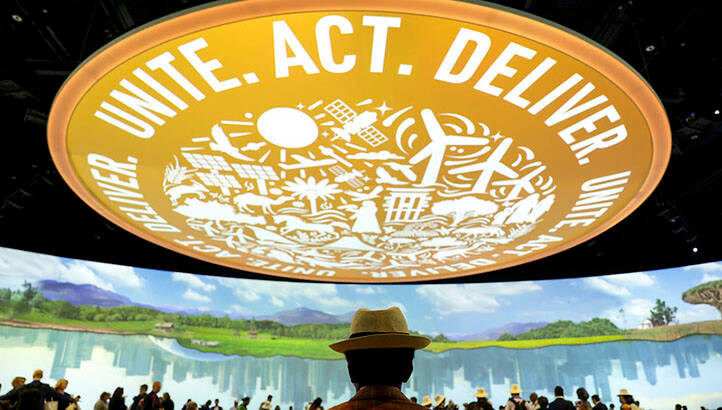
Photo by COP28 / Christophe Viseux UNFCCC Flickr
At the start of COP28, a host of wealthy nations agreed to the calls from small island states to set up dedicated funding streams for loss and damage. The UAE had committed $100m to the fund, a figure that has been matched by Germany. The UK has pledged £40m to the Fund and £20m for other funding arrangements for loss and damage. The US has committed $17m – a move that has been criticised for not being sufficient enough – and Japan $10m.
This funding package will enable developing nations to better adapt to the changing climate and increased likelihood of extreme weather events and improve resiliency against these events.
Since that opening day announcement, adaptation has proved a sticking point during negotiations out in Dubia. A breakthrough was delivered on Sunday morning, when the draft texts of a “’Global Goal on Adaptation” were published by the UNFCCC.
The draft texts are focused on getting countries to agree to a framework – including how finance should be provided – to support developing nations mitigate the worst of the climate impacts in order to protect communities.
It lists seven new adaptation targets, which nations should strive to achieve by 2030. These are focused on climate-resilient food and agricultural production, improving health by mitigating climate impacts and improving resiliency, building and developing more resilient infrastructure, reducing poverty, safeguarding culture and reducing the death toll from climate risks.
The draft has been shackled by nations baulking at certain parameters, including the arguments over financing the Global plan. This has led green groups to criticise the first iteration of the draft texts.
Sandeep Chamling Rai, WWF Senior Advisor – Global Climate Adaptation Policy, said: “The Global Goal on Adaptation latest draft is still missing some crucial elements, despite some improvements. Vulnerable communities desperately need more finance to build resilience to the impacts of the climate crisis. However the text only reiterates the longstanding call for developed countries to double adaptation finance without providing a clear roadmap to deliver it.
“The text is also missing concrete global targets. The current target is still vague and needs to be further strengthened to include key areas that need to see resilience boosted, such as oceans and mountains. It is also concerning to see the target to protect 30% of land by 2030 now missing. Nature is an ally in limiting the impacts of the climate crisis and that must be recognised and acted on.
“For a credible outcome, negotiators must agree on an overall finance target for adaptation and how developed countries can meet their previous commitments to double climate adaptation finance. With some improvements, this text could provide a solid outcome that can help accelerate adaptation efforts on the ground that can shield people and ecosystems from the consequences of rising temperatures.”
It builds on the efforts unveiled at COP27, including the ‘Sharm-El-Sheikh Adaptation Agenda’ programme, headlined by a pledge to improve climate resiliency for at-risk places that are home to some four billion people.
UN pledges to end hunger in line with 1.5C
The UN’s Food and Agriculture Organization (FAO) has unveiled a sweeping three-year programme to radically transform land use and food systems in a bid to eliminating hunger globally while also aligning agriculture with the 1.5C pathway of the Paris Agreement.
The FAO unveiled its ambitious new roadmap on Food, Agriculture and Water Day at COP28 (10 December). The Global Roadmap for Achieving Sustainable Development Goal 2 (SDG2) without Breaching the 1.5°C Threshold outlines more than 120 actions and milestones to transform food production to respond to the twin threats of the climate crisis and chronic hunger globally. The programme bids to deliver the Paris Agreement while ensure that SDG 2: Zero Hunger is delivered.
The FAO has introduced targets to reduce methane emissions from agrifood production and systems by 25% by 2030, relative to 2020 levels, before reaching carbon neutrality by 2035. Long-term targets include transforming the sector into a net-positive carbon sink by 2050, capturing 1.5 gigatons of greenhouse gas emissions annually.
It also sets out a pathway to eliminate chronic undernourishment by 2030 while promoting healthy diets globally by 2050. Additional milestones listed in the roadmap include halving global food waste per capita by 2030 and updating the FAO’s food-based dietary guidelines (FBSG) to ensure each country has recommendations suited to its circumstances on dietary patterns.
Also, see how green groups have responded to the roadmap by clicking here.
Nations forge new alliance of food champions
Building on the huge new UN roadmap was the news that five nations have agreed to spearhead a new alliance aimed at transforming food systems to ensure affordability and nutrition while aligning to the needs of the Paris Agreement.
Brazil, Cambodia, Norway, Sierra Leone and Rwanda have formed the Alliance of Champions for Food Systems Transformation (ACF) and have committed to ‘whole of government’ approaches to transforming food systems.
The Alliance aims to deliver across five key themes: food and nutrition security; adaptation and resilience; equity and livelihoods; nature and biodiversity; and climate mitigation.
The Alliance members will develop a “gold standard” for the value chain of food systems, including food production, processing, distribution, consumption and disposal.
Each country is pledging to strengthen nation policies via ten priority action areas and consistent with science-based targets, update their Nationally Determined Contributions (NDCs), National Adaptation Plans (NAPs), Long-Term Low Emission Development Strategies (LT-LEDS), and National Biodiversity Strategies and Action Plans (NBSAPs) in line with these updated National Food System Transformation Pathways by 2025 and report annually on the new targets.
Paulo Teixeira, Minister of Agrarian Development and Family Farming, Brazil, and co-chair of ACF, said: “Peasant family farmers, Indigenous and local communities, forest collectors, pastoralists, fisherfolk, and agricultural workers, are among the populations most harshly affected by climate change worldwide.
“Yet they are also the central actors who can sustainably transform food systems. Supporting their livelihoods through specifically tailored public policies is essential to achieve an agroecological transition towards healthy, resilient and sustainable food systems.”
Protestors demand plant-based treaty
Prior to the unveiling of the new UN roadmap and the Alliance of nations, protests were held at the main entrance to the Blue Zone in Dubia, calling for the creation of a Plant Based Treaty to be introduced at COP28.
Groups including COBASE, which focuses on how to design natural cities, and the Gherush92 Committee for Human Rights, joined the Plant Based Treaty protest. Placards reading “Sign the Plant Based Treaty” were in several different languages, including Arabic, Spanish, Turkish, Japanese and Georgian.
“The emissions from the food system alone will put the 1.5 and 2C climate target out of reach – we need a safe and just transition of our food system to keep us safe within our planetary boundaries, which is also socially just that gives everyone a voice, and brings everyone to the table,” said Steven George, science ambassador for the Plant Based Treaty.
Enric Noguera from Plant Based Treaty Netherlands said: “We organized this protest to advocate for a just system that looks at solutions in a holistic way, including animals, nature, and people. We advocated for nations to negotiate a Plant Based Treaty that helps guide the much-needed, and urgent, transition of our food systems from destructive animal agriculture toward a truly fair, healthy, and sustainable food system.”
$300m philanthropic funding boost for climate farming
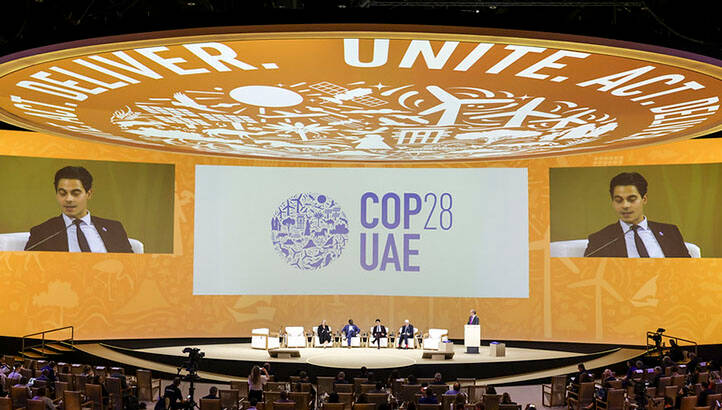
Photo by COP28 / Christophe Viseux UNFCCC Flickr
In a welcome bid to today’s other food based announcements a group of philanthropic investors have ringfenced $300m in funding to boost climate resilient farming practices.
The Philanthropic Statement of Action on Food Systems and Climate has seen $302m committed to support farmers and other key players in food and agriculture to drive ambitious implementation of the goals that world leaders agreed to in the COP28 UAE Declaration on Sustainable Agriculture, Resilient Food Systems, and Climate Action.
A total of 18 funders will support climate agriculture across the globe, linking finance to support efforts that improve nutrition, adaptation, and mitigation and driving wider climate action.
According to the group, funders will “invest, advocate, and partner for food systems to transform to align with 1.5C, the Paris adaptation goals, the Global Biodiversity Framework, and salient elements of the 2030 agenda like food security/nutrition and shared prosperity.”
Statement of action funders include: African Climate Foundation, Instituto Arapyaú, Asian Venture Philanthropy Network, Bezos Earth Fund, Children’s Investment Fund Foundation, ClimateWorks Foundation, Global Alliance for the Future of Food, Global Methane Hub, Grantham Foundation for the Protection of the Environment, High Tide Foundation, Macdoch Foundation, McKnight Foundation, Ode Partners, Robertson Foundation, Rockefeller Foundation, Sequoia Climate Foundation, Stronger Foundations for Nutrition, and the Walton Family Foundation.
“Transforming food systems is a critical part of a climate-friendly future. From sustaining healthy fisheries in support of thriving coastal communities to reducing the greenhouse gas and water impacts of agriculture, we have to make a plan for how we produce our food in ways that also protects water and the planet,” said Pipa Elias, deputy director of the Walton Family Foundation’s Environment Program.
AI solutions unveiled for climate action
Sunday wasn’t solely dedicated to food systems. The UN Climate Change Technology Executive Committee (TEC), together with Enterprise Neurosystem, a non-profit open-source artificial intelligence (AI) community, for example, were also among the headlines.
The two organisations launched the AI Innovation Grand Challenge to identify and support the development of AI-powered solutions for climate action in developing countries. The Grand Challenge was launched in collaboration with the COP28 Presidency.
“We are seeing increasing evidence that artificial intelligence can prove an invaluable instrument in tackling climate change. While we remain mindful of the associated challenges and risks of AI, the Innovation Grand Challenge is a promising step forward in harnessing the power of artificial intelligence and empowering innovators in developing countries,” said UN Climate Change Executive Secretary Simon Stiell.
The Grand Challenge will see AI used to predict climate patterns and extreme weather events, improve crop yields, reduce water usage or optimise renewable energy systems.
H.E. Omar Sultan Al Olama, Minister of State for Artificial Intelligence, Digital Economy and Remote Work Applications, United Arab Emirates, said: “Harnessing artificial intelligence as a strategic asset to mitigate climate change involves integrating it into national policies and plans. This integration facilitates the use of data analytics to align policy with real-time climate data, thereby enhancing its efficacy and advancing technological development and scientific discovery in the field of energy.”
Al Jaber adamant COP28 will finish on time
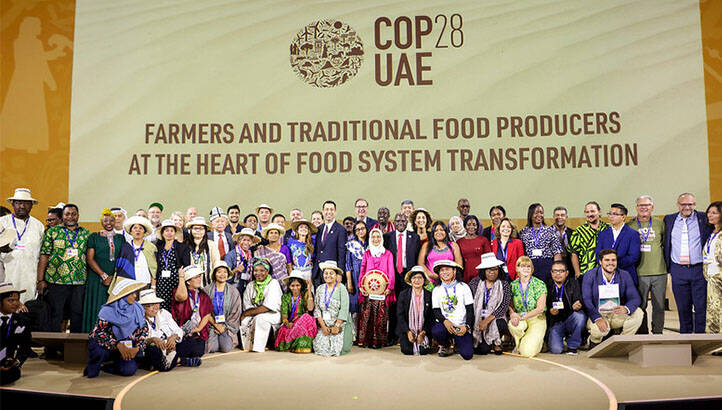
Photo by COP28 / Christophe Viseux UNFCCC Flickr
With around two-and-a-half days of negotiating left at the time of writing, COP28 is indeed coming down to the final stages. The COP29 Presidency is preparing its final package that delegates will be able to read and propose amendments to, in the view of delivering a final agreement by the time that COP draws to a close on Tuesday (12 December).
Historically, COPs do not finish on time. COP27 overran by 39 hours and some still on the ground in Dubai are running sweepstakes as to when it will finish. As the edie team is hosting its end-of-year Christmas Party on the 14 December, you can rest assured that COP28 will finish then, causing our journalists to frantically swap the Christmas crackers for their laptops.
There is still an awful lot to sort out in Dubai, including that new Adaptation Agenda which is missing a lot of key features. There is still the Global Stocktake to consider as well, including the all important language on whether phase-outs of fossil fuels will be included as well as whether “unabated” will be included.
In promising news, the Guardian is reporting that China – historically a key obstacle to the phase-out language – has made it clear it will accept a compromise, while Russia may well relax its position on the role of gas given that COP29 will take place near them in Azerbaijan. However, Saudi Arabia, the Guardian reports, remains the main stumbling block and the UAE’s close ties to that nation could be crucial in delivering a strong final statement on time.
Despite all the intricacies that the final negotiations entail, the COP28 Presidency remains adamant that the summit will finish 11:00 GST on Tuesday 12 December.
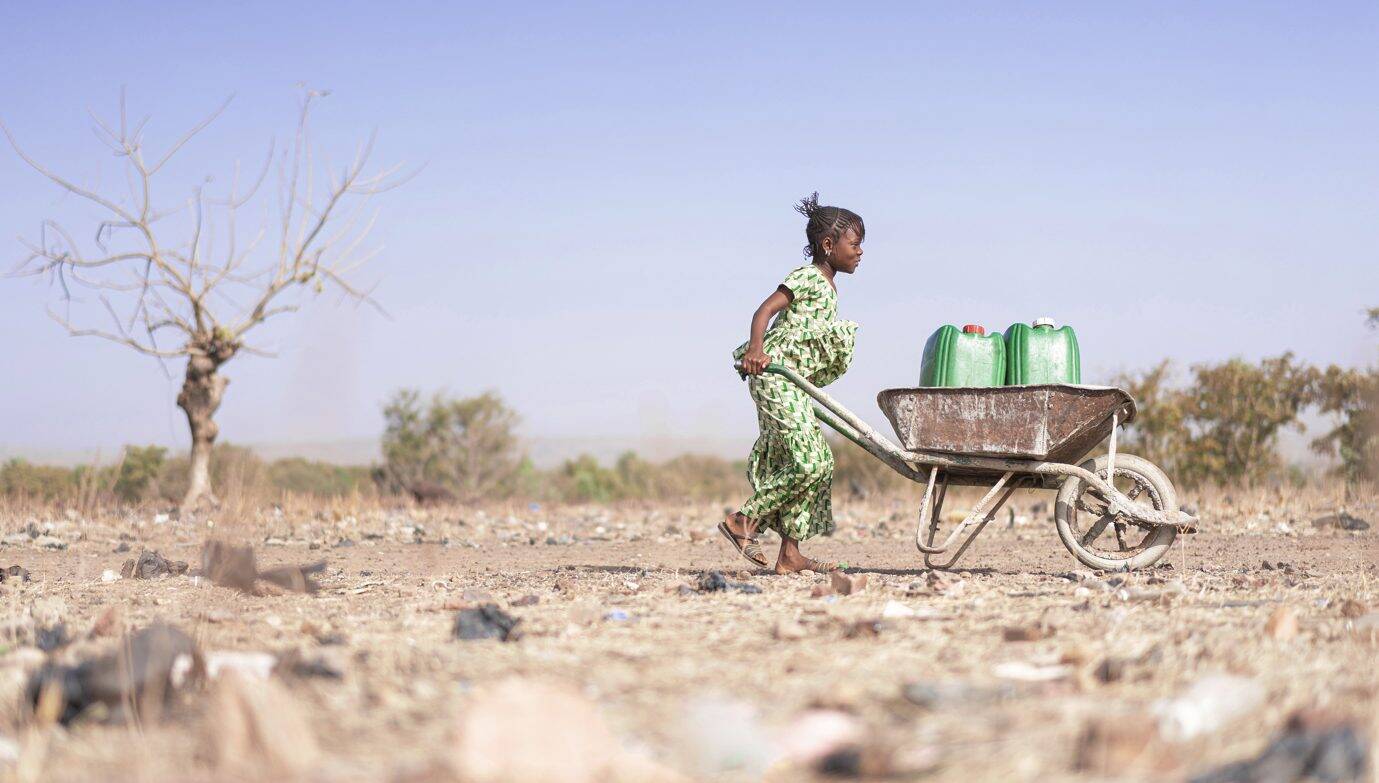
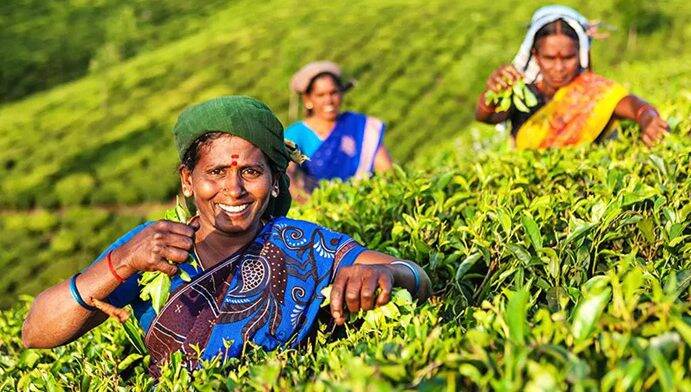
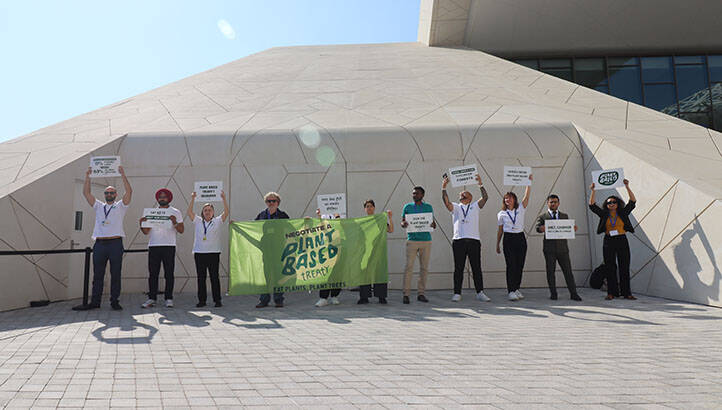


Please login or Register to leave a comment.